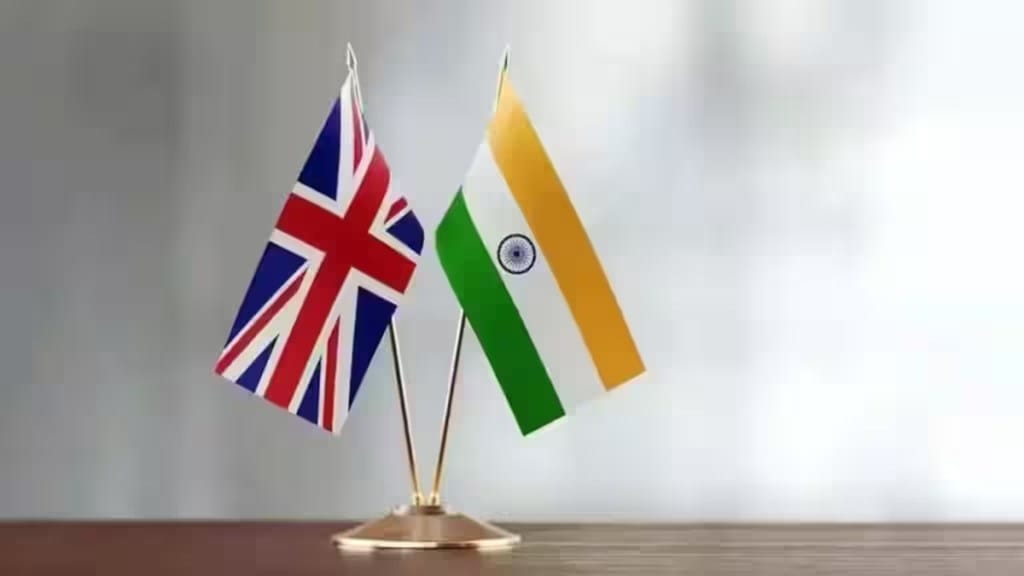Rakesh Mohan Joshi
Never before has there been so much of a global surge for trade partnerships with India. The growth of trade and commerce has also given India a unique position in global geo-strategic affairs as well. The upcoming India-UK FTA deal is also expected to strengthen India’s position on the global scale in many ways. The negotiators on both sides are working to ensure that it’s a win-win deal for both the economic powerhouses.
The FTA negotiations are at a crucial stage as it enters the final phase. Both Indian and UK negotiators are working overtime to prepare themselves with robust groundwork based on empirical impact assessment of last-minute contingent measures required. The FTA announcement missed the deadline of Diwali 2022 set by the erstwhile British prime minister Boris Johnson, primarily because of political turmoil in the UK and difficulty to find consensus on contentious issues with conflicting interests.
However, the ground situation this time seems quite different. There has been a higher level of preparedness, where the entire Indian government machinery—from a junior assistant to the prime minister himself—has burned the midnight oil as a routine rather than an exception. The strong commitment and unprecedented mutual trust between the two PMs Narendra Modi and Rishi Sunak, despite a number of divergent interests and contentious issues between the two countries, is going to be critical to the timely conclusion of the deal.
Consequent to the UK’s exit from the European Union, popularly known as Brexit, in January 2020, British trade and investment were affected. To cope with growing economic woes, the British government is actively exploring alternatives not only to boost its trade and economy but also as a face-saving exercise politically. In post-Brexit UK, the FTA with India is being largely perceived as a major prize not only benefitting its trade but also strategically significant to counter China and strengthen its relations with India, world’s largest functional democracy.
As the FTA talks enter the final phase, trade negotiations are getting increasingly complex and challenging for negotiators from both sides to reach a consensus, especially on some contentious issues such as rules of origin, tariffs on alcohols, scotch whiskey, data localisation and non-trade issues such as movement of people, visa regulations, services trade, patent laws and climate change.
Consensus over rules of origin is getting increasingly difficult as the present-day manufacturing is progressively integrated with global supply chains in a much more complex manner than ever before. Sectors with high import contents from multiplicity of sourcing countries such as electronics, chemicals, synthetic textiles, and so on need due consideration to sensitivities of both the sides. Reciprocity in government procurement is another sensitive area of negotiation that calls for due diligence while concluding the deal, as India, presently, does not have any commitment under government procurement under the WTO and is keen to protect interest of domestic firms.
Non-trade issues such as labour, sustainability, climate change, emission etc are indeed complex and offers formidable challenges for Indian negotiators to agree with in view of the ground realities and domestic legal framework. While India is committed to conclude the deal early, the British negotiators should also appreciate the ground realities and move ahead so as to arrive at mutually rewarding trade partnership.
The UK is one of India’s important trade partners and is among the few countries with whom India enjoys a trade surplus since 2004. Textile is India’s most important export product to the UK wherein India has a whopping trade surplus of $1.6 billion. This FTA holds enormous potential to facilitate Indian textile industry to increase its competitiveness in the UK market as competing countries such as Pakistan, Bangladesh, and Sri Lanka enjoy free access to the British market under UK’s Generalised Scheme of Preference (GSP). Such tariff concessions are not available to India. Indian textile products such as women’s apparel, shirts, trousers, bed-linens etc, on which 10-12% import duty is levied in the UK are expected to benefit.
The trade deal is also expected to benefit the UK industry by enabling it to provide better access to its products in India, the world’s fastest growing major economy and one of the largest markets with 1.4 billion people. British automobiles are likely to be benefited from import duty reduction from 100 % to 50%, or even more for some limited cases.
Since India is the world’s largest consumer of whiskey, accounting for half of the world’s whiskey consumption, removal of import tariffs on scotch may also make the British whiskey industry as one of the gainers of India-UK trade agreement as well.
This trade deal is much more comprehensive and ambitious as it includes non-trade issues such as digital trade, intellectual property rights (IPRs), government procurement, services trade, labour, etc.
India and the UK are very likely to unleash enormous opportunities not only in trade and investment but also in forging strategic international partnership at the world for a, making it a win-win deal.
(The Author is Director, IIPM Bengaluru, and professor, Indian Institute of Foreign Trade, New Delhi.

